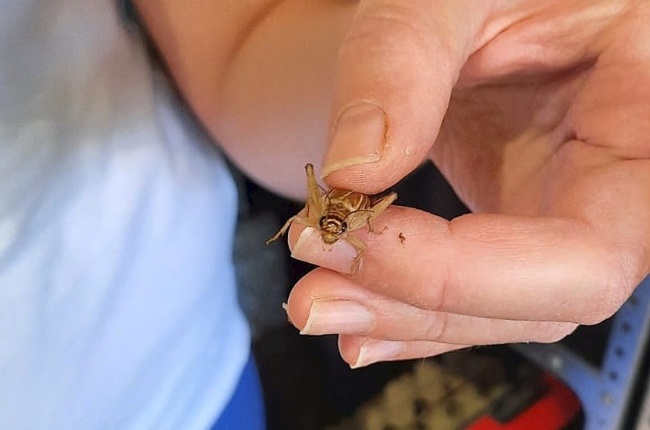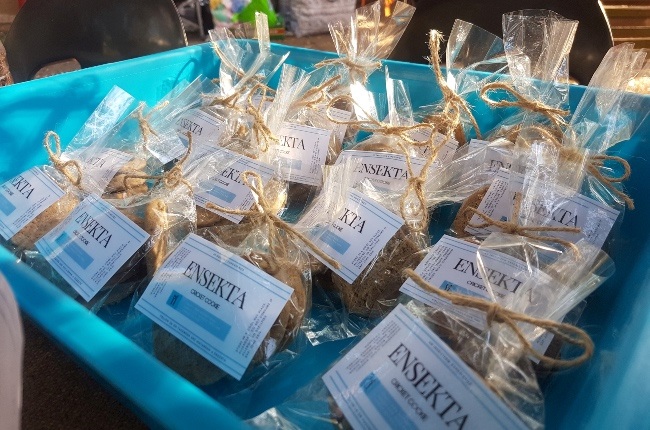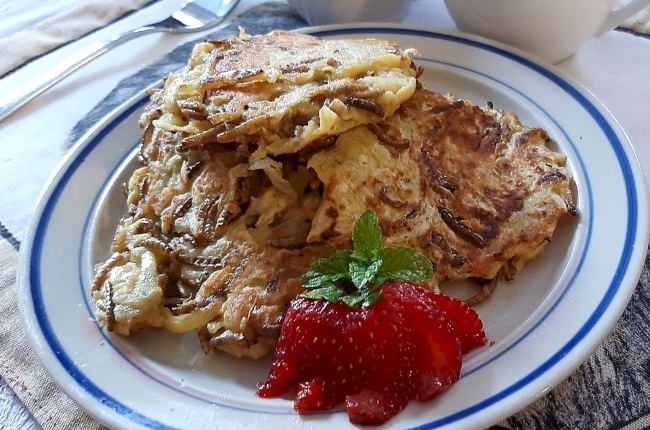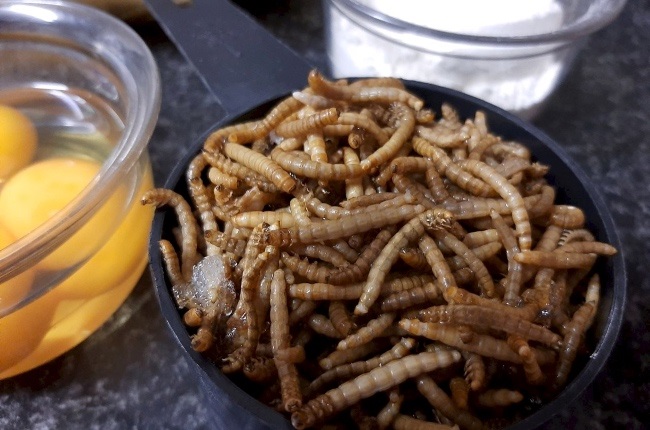
Fancy a marinated cricket kebab for dinner? How about some mealworm flapjacks for breakfast or a chocolate-coated silkworm to satisfy that sweet tooth?
For many people eating insects is best left to Fear Factor participants, right? Because they have an incentive to do so: a big, fat cash prize.
But gobbling goggas isn’t just the stuff of reality shows. More and more people both internationally and locally are adding bugs to their diets.
“Insects are being viewed as the new protein,” says Joburg-based insect expert Joanne Techow. “Take crickets – they’re regarded as a super-food as they have up to twice the protein of beef. When you grind it down into a powder it's a highly versatile product that fortifies ordinary foods.”
The 28-year-old zoology graduate is one of SA’s emerging insect entrepreneurs. She started her business, EnseKta, in 2019 and among her most popular products are cricket powder – which, she says, people can sprinkle onto everything from smoothies to bread to salad dressing – as well as mealworm granola and cricket cookies.
It’s a full-time job and so far it’s proving pretty profitable, she says.
Before lockdown, her insect treats were selling like hot cakes at local markets.
“There are always those who won’t eat them, but many people are interested in trying them out. Often they don’t mind the taste either. Most people say crickets taste nutty.”
Children are often the most keen to try it. “Kids are more open-minded,” Joanne says. “They don’t have the built-in negativity towards insects that adults have. We’re looking at children at being the gateway for growing the industry.”
Joanne has two main types of customers: fitness fanatics and the environmentally conscious.
“The fitness buffs are often bodybuilder types and they’re always looking for new protein. Environmentally aware people want to embrace a healthier lifestyle and help the planet.”
While traditional big food companies are still a bit hesitant to invest, Joanne says this is changing. “People are doing research and can see the demand is growing. It’s a more sustainable food source for the planet and leaves a far smaller carbon footprint than traditional meat sources.
“At the moment I’m financing everything myself but I’m hoping to find a suitable investor.”
While she accepts that eating insects isn’t for everyone, she does have one goal. “I’m not trying to fully replace traditional protein sources, but we need to decrease pressure on these resources. If I can get a family of five to have one insect meal a week then I’ll be happy – we’ll save a lot of cows.”
So how did the daughter of a marketing manager and a sales rep, who grew up in a family of five in the city, get into farming insects as a career?
“I’ve been obsessed with nature from a young age and after school I did a BSc in zoology.”
She followed it up with a business management course before volunteering at the Endangered Wildlife Trust.
“They put me on a project on researching alternative livelihoods and that’s when I stumbled across insect farming. I was totally amazed by it. I then partnered with friends who’d opened a company farming crickets in 2017. In 2018 I worked on a black-soldier fly farm and soon after that I started my own company.”
She’s involved in every aspect of the business, from the day-to-day farming to the packaging, marketing and selling of products.
Joanne keeps her bugs in crates in her garage, which she’s converted into her insect warehouse, and euthansises them by placing them in the freezer, where their body temperature gradually decreases. There’s no pain or trauma involved, she says.
The practice of eating insects – called entomophagy – has been around for centuries, Joanne says.
“It’s common to cultures in many parts of the world including Central and South America, Africa, Asia and Australia.
How many insects does she have? “About 32 000 crickets and 10 000 mealworms. Silkworms are seasonal and sometimes I buy other types.”
Joanne is also looking to expand into indigenous insects such as mopane worms, termites and stinkbugs.
While lesser known as a food source, stinkbugs are considered a delicacy in South Africa, she adds. But what about the smell? “Once you’ve boiled them the stink is released. You then usually roast and dry them.”
Last year she completed her honours project, which looked at which caterpillars are edible. Turns out the pretty, brightly coloured ones aren’t. “They’re usually poisonous.”
And, dare we ask, what about the scourge of South African households: the dreaded cockroach? “Not even I am willing to stomach one of those,” she says, laughing.
“But I’ve seen recipes for cockroaches. If you farm them, they’re clean. It’s just the ones in your house that carry disease as they’re living in dust and dirt.”
Insects are rich in protein, healthy fats, micronutrients and omega 3 and 6 oils.
Crickets contain to 70% protein, all nine amino acids, more iron than spinach and more calcium than milk.
Mealworms have around 40% protein and more fats while silkworms have around 20% protein but are low in fat.
Insects are environmentally sustainable. They require far less food, water and space than traditional livestock (such as cows) and produce fewer greenhouse gases.
Insects have a variety of flavours: the black field cricket tastes like liquorice while the brown house cricket is nutty.
Mealworms taste like chicken; silkworm pupae have an earthy taste; termites are salty, and sago grub tastes like bacon. “What the insects eat also plays a role in their final flavour. For instance, if they’re fed a cinnamon diet they’ll have a cinnamon flavour,” Joanne explains.
Are there any no-no’s when it comes to eating insects?
“Never eat them raw because they can contain harmful bacteria in their gut. Boiling them for five minutes gets rid of this. Also don’t eat insects harvested from the wild as they may have been exposed to pesticides. And don’t buy insects from pet stores because there’s usually no quality control.”
Similarly don’t go collecting insects around your house or garden to eat. “You don’t know what they’ve eaten. Only buy from a reputable breeder.”
Breeders use only top-quality livestock feed, which is safe for human consumption.
Away from her insects, Joanne is an avid DIY fan, photographer and animal lover with a menagerie of pets that includes reptiles, dogs and chickens.
She credits her family for their unwavering support as well as close friends, who are “always up for tasting my new recipes”.
And it seems the sky is the limit as to what she can produce. “With my silkworms, for example, I’m left with hundreds of cocoons. So I’m thinking of getting a spindle and making silk bedding and clothing.”
And, yes, her unusual vocation remains a conversation starter of note.
“People can’t believe what I do and always ask millions of questions. I’m naturally an introvert but I’m more than happy to discuss my bugs.”




 Publications
Publications
 Partners
Partners





















